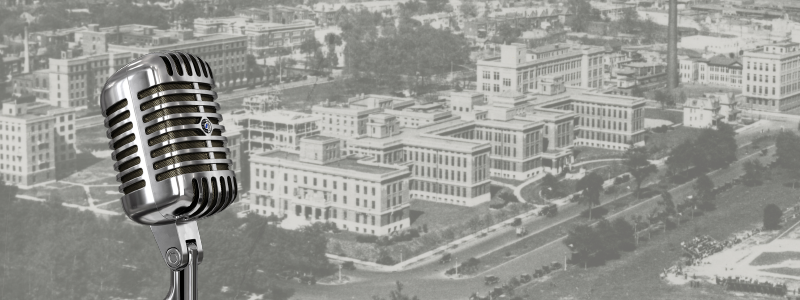
Washington University School of Medicine Oral Histories

Carl F. Cori Oral History
Interviewer
Paul G. Anderson, PhD
Loading...
Summary
Carl F. Cori was interviewed by Paul G. Anderson for approximately 90 minutes.
Scope and Content
Cori recounts his education in Trieste and Prague and his service as a medic in World War I. He describes his early research in pharmacology in Europe and then his and his wife's emigration to the U.S. when Cori accepted a position as chief biochemist at the State Institute for the Study of Malignant Disease in Buffalo, New York in 1922. The interview covers Cori's acceptance of the position of head of the Department of Pharmacology at the Washington University School of Medicine in 1931, his gradual shift to the Department of Biochemistry, and winning the Nobel Prize in physiology or medicine with his wife and Bernardo Houssay in 1947. Cori discusses several of his colleagues at the Washington University School of Medicine, including Leo Loeb, Joseph Erlanger, Evarts A. Graham, Robert J. Terry, Oliver Lowry, and W. McKim Marriott.
Biographical Information: Interviewee
Carl Ferdinand Cori (1896-1984) was born in Prague (then located in the Austro-Hungarian Empire), the son of a noted Austrian biologist. Cori began medical study in his native city, but this was interrupted by military service in World War I, during which he served as a medic on the Italian front. While a student again after the war, he became engaged to a classmate, Gerty Theresa Radnitz. The two were married in Vienna in 1920 shortly after receiving their medical degrees. Both chose research careers, but it proved very difficult to find suitable positions in war-impoverished Austria. In 1922, the Coris emigrated to the United States, where Carl took a position in Buffalo, at the State Institute for the Study of Malignant Disease (now Roswell Park Memorial Institute). In 1931, Cori was appointed professor and chairman of the Department of Pharmacology at the Washington University School of Medicine in St. Louis. He would later switch departments and become professor and chair of the department of Biochemistry in 1946. Working with his wife Gerty, the Coris most notable contribution to science was their series of discoveries that elucidated the pathway of glycogen breakdown in animal cells and the enzymic basis of its regulation, now known as the Cori Cycle.
Biographical Information: Interviewer
Paul G. Anderson, PhD served as an archivist at the Washington University School of Medicine library from 1982-2008. He earned a PhD (American History) from Wayne State University in 1977.
Interview Date
1982-10-18
Collection Identifier
OH056
Length
Approximately 1 hour and 30 minutes.
Restrictions
Users wishing to publish (in whole, or in part) content taken from the audio or transcript of this oral history interview must request, sign, and return a Statement of Use form to the Becker Archives. For detailed information regarding publication and use of this oral history, contact the Becker Archives (arb@wusm.wustl.edu).
Recommended Citation
Carl F. Cori Oral History, OH056, Bernard Becker Medical Library Archives, Washington University in St. Louis.
Disclaimer
The Becker Archives provides access to this oral history interview as a record of the past. This interview reflects the attitudes, perspectives, and beliefs of the interview participants, which may reflect outdated, biased, and offensive views and opinions. The Becker Archives does not endorse the views expressed in this interview, which may contain materials offensive to some users.




Notes
The audio quality of the interview is inconsistent.